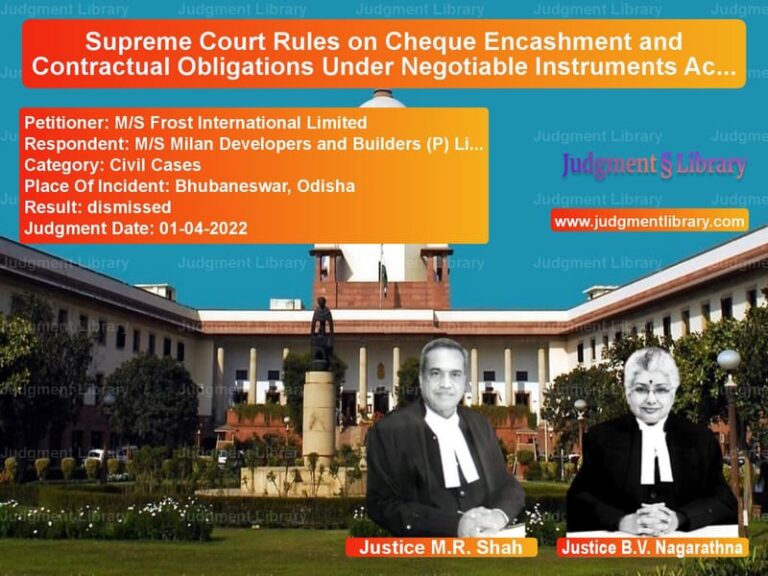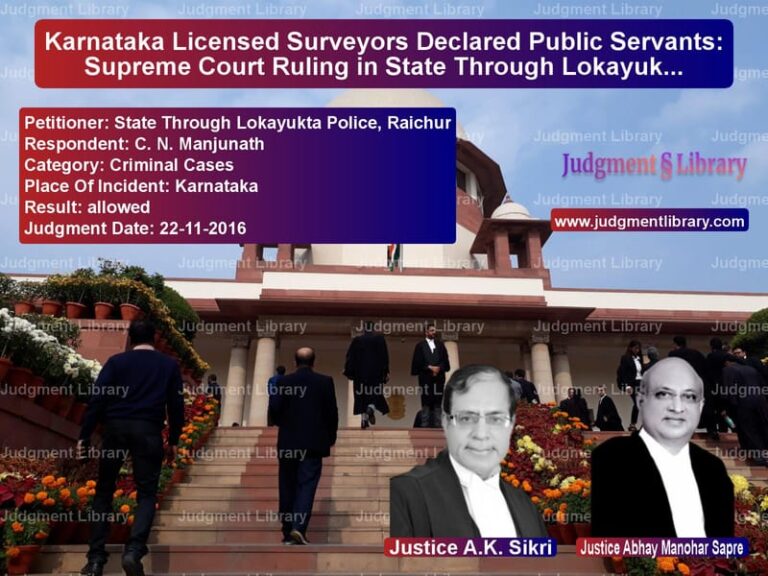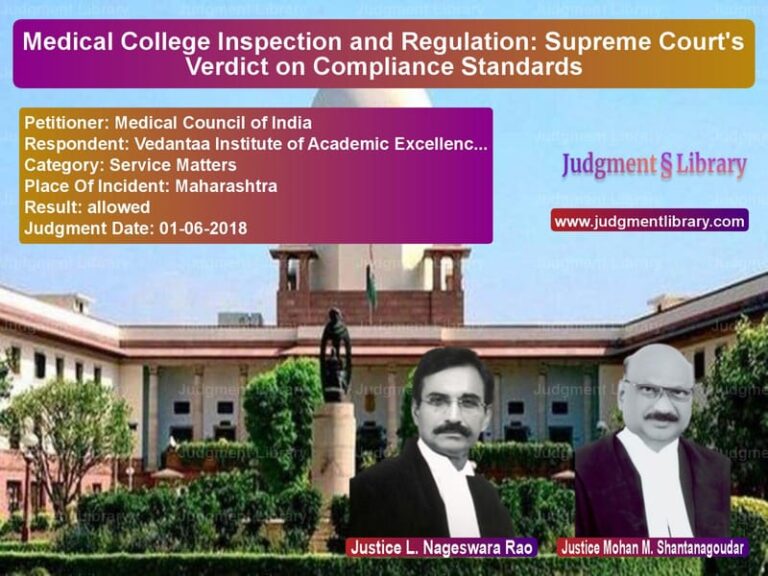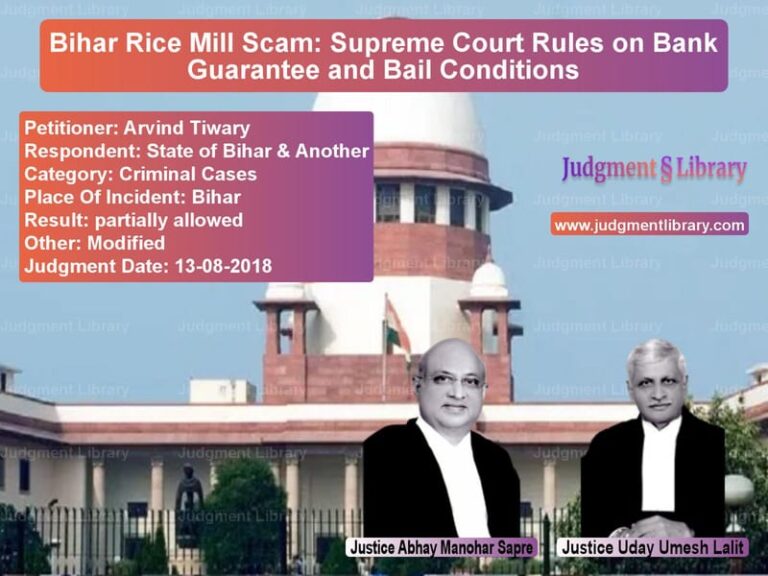Narmada Bachao Andolan Case: Supreme Court Orders Compensation for Project Affected Families
Introduction
The Supreme Court of India, in the landmark case of Narmada Bachao Andolan v. Union of India & Others, addressed the long-standing issue of rehabilitation and compensation for families affected by the Sardar Sarovar Project (SSP). The case, originally filed in 2002, sought relief for thousands of ‘project affected families’ (PAFs) who had been displaced due to the construction of the dam. The Court’s ruling provided a structured compensation framework for these families and set out clear directions for their rehabilitation.
Background of the Case
The Sardar Sarovar Project led to the displacement of numerous families across Madhya Pradesh, Maharashtra, and Gujarat. The petitioners, led by Narmada Bachao Andolan, argued that:
- Many affected families had not received proper compensation.
- The Special Rehabilitation Package (SRP) was flawed.
- Several families had been duped by middlemen and had not received the intended benefits.
- The government had not implemented the 1979 Narmada Water Disputes Tribunal Award properly.
To resolve these concerns, the Supreme Court directed the formation of a Grievance Redressal Authority and undertook an extensive review of the compensation process.
Petitioners’ Arguments
The petitioners, including Narmada Bachao Andolan, argued:
- Many affected families had been given compensation in installments, but several were deprived of the second installment.
- Some families had opted for land in lieu of cash compensation, but they had not been given their rightful share.
- The government failed to protect vulnerable families from fraudulent practices of middlemen.
- The compensation process lacked transparency, leading to massive corruption.
- The failure to rehabilitate displaced families violated their fundamental rights under Article 21 of the Constitution.
Respondents’ Arguments
The government, represented by the Attorney General of India and state government officials, countered:
- A large majority of families had already been compensated.
- All rehabilitation measures were in compliance with the Narmada Tribunal Award.
- Delays in compensation were due to administrative hurdles, but efforts were being made to address them.
- Families who had been duped would be identified and assisted.
Supreme Court’s Observations
After extensive hearings, the Court acknowledged the concerns raised by the petitioners. The key findings included:
“Out of 4998 project affected families in Madhya Pradesh, 4774 opted for the Special Rehabilitation Package. However, 510 families had not received full compensation.”
The Court also noted:
“1358 families were duped by middlemen and lost their compensation, leaving them without land or financial security.”
The Court emphasized that compensation must be provided in a manner that ensures the affected families are not left without support. The following directives were issued:
- 681 families who had not received full compensation would be paid Rs. 60 lakh each.
- 1358 families who had been duped would receive Rs. 15 lakh each.
- All compensation payments had to be completed within three months.
- Families had to provide an undertaking that they would vacate the submergence areas by July 31, 2017.
- State governments were directed to expedite rehabilitation measures.
Key Judgment Excerpts
The Court highlighted:
“The project affected families must be compensated fairly and in a timely manner. Failure to do so would amount to a grave injustice.”
Additionally, addressing fraudulent practices, the Court stated:
“Poor oustees, particularly tribals, have been looted by middlemen. They have lost their livelihood and are left without means of sustenance.”
The Court further clarified that:
“All pending civil and criminal litigations related to compensation fraud shall be closed with this settlement.”
Final Judgment
The Supreme Court issued the following key rulings:
- All 681 families yet to receive compensation would be paid Rs. 60 lakh each.
- The 1358 families duped by middlemen would receive Rs. 15 lakh each, with prior payments deducted from the final amount.
- All project affected families had to vacate the submerged areas by July 31, 2017.
- Gujarat and Maharashtra governments were instructed to complete all pending rehabilitation efforts within three months.
- All pending litigations related to the project were deemed closed.
The Court also noted that its ruling was passed under Article 142 of the Constitution and could not be treated as a precedent.
Conclusion
The Narmada Bachao Andolan case serves as a significant ruling on rehabilitation and compensation for displaced families. While upholding the government’s efforts, the Supreme Court ensured that those affected received justice. This ruling reinforced the importance of fair compensation and proper implementation of rehabilitation policies.
Don’t miss out on the full details! Download the complete judgment in PDF format below and gain valuable insights instantly!
Download Judgment: Narmada Bachao Andol vs Union of India & Oth Supreme Court of India Judgment Dated 08-02-2017.pdf
Direct Downlaod Judgment: Direct downlaod this Judgment
See all petitions in Environmental Cases
See all petitions in Damages and Compensation
See all petitions in Judgment by Jagdish Singh Khehar
See all petitions in Judgment by N.V. Ramana
See all petitions in Judgment by Dhananjaya Y Chandrachud
See all petitions in allowed
See all petitions in settled
See all petitions in supreme court of India judgments February 2017
See all petitions in 2017 judgments
See all posts in Environmental Cases Category
See all allowed petitions in Environmental Cases Category
See all Dismissed petitions in Environmental Cases Category
See all partially allowed petitions in Environmental Cases Category







